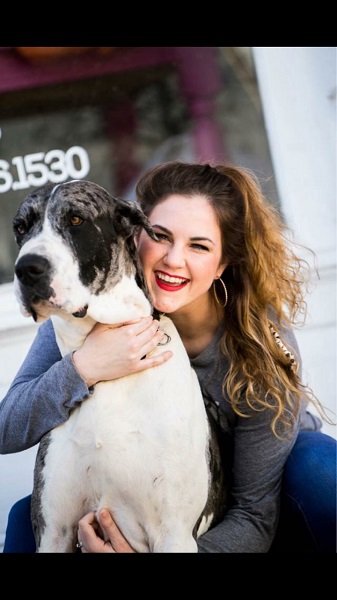Family Credits New Neurosurgeon For Saving Daughter Critically Injured In Wreck
11/21/2018
They saw the car a second before it hit them broadside, running the red light. Twenty-five year-old Sidney Shea Tennison and her friend were critically injured. Witnesses immediately rushed to their aid calling 9-1-1, while others chased the car which had left the scene.*
Sidney had hit her head so hard that part of her skull was crushed and denting into her brain. She was rushed to nearby Northwest Medical Center-Bentonville then transferred to Northwest Medical Center-Springdale where neurosurgeon Dr. Quoc-Anh Thai (pronounced Tie) was waiting for her.
Sidney was in Centerton working to open a new Rib Crib restaurant, even as she was finishing up her degree in kinesiology / physical therapy. She and her friend had travelled from their homes in Oklahoma to train staff for the day and were heading back to their hotel when the wreck happened around 10:30 pm on Thursday, November 8.
 Her mother received the first call from Sidney’s husband Cameron, whom she’d just married in June.
Her mother received the first call from Sidney’s husband Cameron, whom she’d just married in June.
“He was hysterical, truly terrified, so we prayed together before my husband and I left the house for the hospital,” said Kristina Eaton, Sidney’s mother. “On our way, I got a call from Alex, a Northwest nurse, who was very calm. I believe he was with the anesthesiologist preparing her for surgery then because he was asking me about any allergies or medical conditions. The next call came directly from Dr. Thai before the surgery. He said Sidney’s skull was depressed or dented in because of the crushing injury and that he would be performing a very serious surgery that would take two to three hours. Even though he reiterated that it was very serious, his voice was very calming for me. It was as if this was an everyday surgery for him. He also spoke very clearly, in a manner I could understand.”
A Johns Hopkins-trained neurosurgeon who joined Northwest Health this summer, Dr. Thai specializes in computer-guided brain surgery and minimally invasive spine surgery. His experience has spanned the breadth of neurosurgical practice settings, including rural solo private practice, integrated community hospital networks, and large tertiary academic university and trauma centers. His most recent position was Division Chief of Johns Hopkins Neurosurgery, National Capital Region, and Johns Hopkins School of Medicine in Maryland.
“Sidney had suffered a large depressed skull fracture that placed her in a deep coma. We took her emergently to surgery to remove all the bone fragments, which were pressing on her speech center,” he explained. “We left the bone off, in order to allow for the expected cerebral edema or swelling.”
Two hours later, Dr. Thai called Kristina again to let her know the surgery had gone “extremely smoothly." He seemed to be surprised that there was no damage to her brain, she said.
After additional CT scans, Dr. Thai told the family that he expected a 100% recovery.
“Dr. Thai was there when we got to the hospital in the early morning hours to see Sidney in the ICU. And he was there to meet with us again at 6 am. I’m not sure he ever went home. He said the first 24-48 hours were the most critical and that she needed rest which is why she was in a medically induced coma.”
Because of the injury to Sidney’s skull, Dr. Thai wasn’t able to save the part of the bone that was removed to allow for swelling.
“Since the bone was so severely broken from the trauma, it is not able to be replaced back into the head. In the past, we had to rely on shaping titanium mesh (what some call a “metal plate”) to repair large skull defects like hers, but this would have presented cosmetic problems.”
To solve this problem, Dr. Thai had a specialized CT image taken of Sidney’s remaining skull. The images were then sent to a company that uses the detailed scans to leverage 3-D technology. They’re in the process now of reconstructing a synthetic bone that perfectly matches her skull (made of poly-ether-ether-ketone, or PEEK). The 3-D reconstruction technology is the same technology that is used at Johns Hopkins.
“This will allow us to do Sidney’s second surgery, a cranioplasty, to repair the defect and close her skull. This second surgery will be done in mid-December, allowing a few more weeks to let the brain swelling go down. Sidney has recovered from her coma and is doing very well, currently in the acute care rehab unit right here,” Dr. Thai said. “She is recovering her speech and getting better with her Broca’s aphasia each day.” (Broca's aphasia results from damage to a part of the brain called Broca's area, which is located in the frontal lobe and is a part of the brain responsible for speech and motor movement.)
Many medical professionals have played key roles in Sidney’s ongoing recovery, Dr. Thai points out. “Dr. Madhu Kalyan, a pulmonary and critical care specialist who did his residency at the nationally known Cook County Hospital, was a vital part of the team while Sidney was in the ICU. He oversaw her care there and managed her induced coma. All of our critically ill patients benefit from his leadership and our multidisciplinary team here.”
Even though the family lives in Oklahoma, they wanted to come back to Springdale for her second surgery because they trust and respect Dr. Thai and the staff. “This man cares. And he has a great bedside manner. He makes us laugh.”
“Sidney is doing great,” her mom reiterates. “The part of her brain that’s used for understanding is fine. We knew she was ‘still in there’ when we saw her sense of humor start to come out. Her talking is still impacted but she’s making progress every day.”
“She’s had phenomenal care. I truly believe Dr. Thai is why she’s alive today, both his skills and the fact that they were able to get her here so quickly.
Sidney’s family is gathering in the Activity Room in Northwest Medical Center-Springdale’s rehab unit to celebrate Thanksgiving as a family on Thursday. It will be a time of special celebration this year.
On January 14, Sidney’s husband Cameron is supposed to leave for the Air Force where he’ll begin basic training in San Antonio, Texas. Her family has encouraged him to continue with his plans, promising to take care of Sidney as she continues her recovery and prepares to do her physical therapy internship. Because Sidney turns 26 in December, she will no longer be on her parents’ insurance plan as of the end of the year. If Cameron continues with his current plans, Sidney will have access to military insurance in January. In the meantime, her family has set up a Go Fund Me account to help cover Sidney’s medical bills and the family’s travel expenses. While Sidney is in treatment, the family is able to stay in a guest suite at the hospital, conveniently located and significantly less expensive than a hotel. Sidney hopes to be discharged shortly to continue her recovery at home while awaiting her next surgery.
Her mom – in fact, her whole family – knows Sidney is the type of person who will use the experience she’s going through now to be an extra special blessing to those she’ll care for in her future career in health care.
*While the accident that injured Sidney and her friend remains under investigation, the driver is being charged with driving while impaired and leaving the scene of an accident. Sidney’s friend is recovering from a broken leg.

Sidney has this photo of her with her dog Jaaz up in her rehab room.
Back